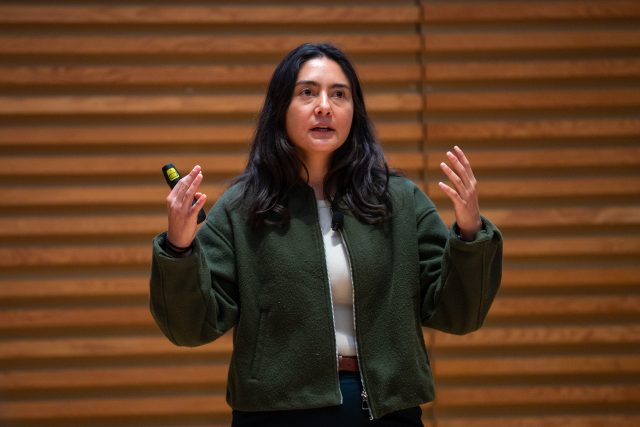[ad_1]
About 350 University of Michigan students and faculty gathered in the Stamps Auditorium Thursday evening to listen to Erika Cheung discuss her experience as a key whistleblower who exposed fraud at Theranos, a biotech startup company.
Theranos, founded in 2003 by Elizabeth Holmes, claimed it created technology that could test small blood samples for conditions like cancer and diabetes efficiently through their Edison machines. These claims were proven to be fabricated, and Holmes was charged with fraud in 2018 and sentenced to 11 years in prison in 2022.
Stacie Edington, director of the College of Engineering Honors and Engagement Programs office, said in an interview with The Michigan Daily that she felt Engineering students had much to learn from Cheung’s experiences and that hearing from her will be valuable to them in future career endeavors.
“Our students are able to resonate well with her, because they can understand what it’s like to be a new career scientist and enter a field that you’re just getting to know,” Edington said. “I think her experience really demonstrates the importance of ethics and integrity and courage in engineering and science, and that’s part of what this program is all about.”
Engineering Dean Karen Thole opened the event by talking about the Michigan Engineering Common Reading Experience, which assigns and provides first-year Engineering students with a book to read over the summer. For the 2024-25 academic year, the program selected the book “Bad Blood: Secrets and Lies in a Silicon Valley Startup,” which explains the Theranos scandal and Cheung’s role as a key whistleblower who helped reveal the company’s fraudulent practices.
“There are so many different facets of this book,” Thole said. “I found myself after reading the book. Every time my mind would wonder about something, I’d think about a different aspect and a different lens in which to look at this story. Truly an amazing story.”
Engineering freshman Emma Ebner said reading “Bad Blood” made her think about the importance of ethics, which she said was further emphasized by the event.
“It reinforced what I read about,” Ebner said. “(The book) makes you think about making sure something is ethical when you’re creating a new product and working for a company.”
Cheung opened her speech by talking about Holmes’ rise to fame. She said the founder started getting attention from investors and the media in 2009.
“She got tons of people to believe in her,” Cheung said. “She had some of the most high profile people in politics and investors throughout the country to buy into her.”
Cheung said she wanted to work for Theranos because the company had the potential to change the health care industry by making blood testing easier.
“The key idea here about why this is so special is that if you were able to solve the problem of making lab diagnostics more accessible, less painful, more affordable, you could get tested more frequently, and potentially with all that data, you could predict disease before it happened,” Cheung said. “You could open the doors to a whole new way of conceptualizing medicine.”
Cheung’s job at Theranos was to test patient samples in the machines and verify the precision of the results. She said as she was conducting these tests, she started to notice that the tests were producing vastly different results.
“(I was seeing a) 50% failure rate for 2,000 patients a day, I was forecasting that I could potentially produce false results for about 1,000 patients a day,” Cheung said. “So the stakes were getting higher and higher, and my concern about what was happening at Theranos was getting increasingly more.”
Cheung said she brought her concerns to the company’s chief operating officer, Sunny Balwani, who dismissed them. She said this led her to decide to quit because she did not feel right about continuing to process patient samples.
“I knew I didn’t necessarily know everything about building medical devices and lab diagnostics, but the one thing I couldn’t stand by was the fact that when we made a mistake on a patient, we didn’t let them know,” Cheung said. “I couldn’t do what Sunny was asking me to do, which was to process patient samples without question.”
Soon after, Cheung said she was contacted by The Wall Street Journal, and she shared her experiences working for Theranos as an anonymous whistleblower. Cheung said the biggest thing she learned from her experiences with the Theranos case was the importance of ethics.
“The one thing that I think is really fundamental to the Theranos case is that leadership and ethics matter,” Cheung said. “It didn’t matter how talented the people we had there, how much money we had, how much fame we had. If you have poor leadership, the products and the innovation are not going to get anywhere.”
Daily Staff Reporter Paige Stallman can be reached at pstall@umich.edu.
Related articles
[ad_2]
Source link











